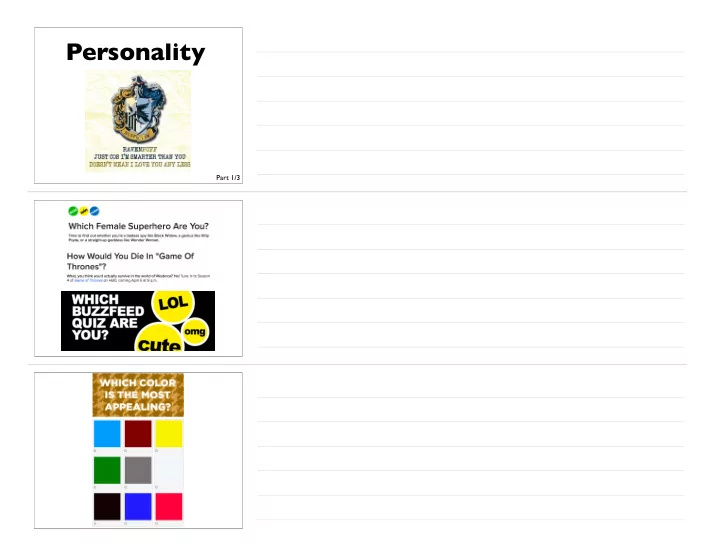

Personality Part 1/3
200 million per month!
“How does the mind work?” “How does… Jack’s Jasmine’s Jabari’s Jill’s Jan’s Jacob’s mind work?” Personality a person’s characteristic style of behaving, thinking, feeling, and interacting with others
… Jasmine Jill Jack Personality Humans Traits Jabari Jan Jacob … … Creativity Jasmine Jill Jack Humans Persistence Jabari Jan Sociality Jacob … … Focus Jasmine Jill Jack Humans Loyalty Jabari Jan Open- Jacob Mindedness …
Questions + Themes What are personality traits, and (how) can we measure them? How do we differ, and why ? How much of how we behave is inherent to us (vs. to social situations, education, upbringing, culture)? Test-Retest Reliability Validity
Rorschach Test It is important to see this blot as two human figures, usually females or clowns. If you don’t, it’s seen as a sign that you have trouble relating to people. You may give other responses as well, such as “cave entrance” (the triangular white space between the two figures) and “butterfly” (the red “vagina”, bottom center) State being anxious right now (but maybe not later) Trait being an anxious person (in general)
Myers-Briggs Type Indicator Myers-Briggs Type Indicator
Myers-Briggs Type Indicator 50% of people get a different type upon retaking the test! Myers-Briggs Type Indicator weakly predicts good managers, teammates, etc. The “Big Five” Openness to Experience Conscientiousness Extraversion Agreeableness Neuroticism (“emotional stability”)
The “Big Five” O penness to Experience C onscientiousness E xtraversion A greeableness N euroticism The “Big Five” O penness to Experience C onscientiousness E xtraversion “I am easily A greeableness distracted” N euroticism The “Big Five” O penness to Experience C onscientiousness E xtraversion “I remain A greeableness calm in tense situations” N euroticism
The “Big Five” O penness to Experience C onscientiousness E xtraversion “I am generally A greeableness trusting of others” N euroticism The “Big Five” O penness to Experience C onscientiousness E xtraversion A greeableness N euroticism The “Big Five” Not 2? Not 18,000? O penness to Experience C onscientiousness E xtraversion A greeableness N euroticism
Personality Up next: Part 2/3 Personality Part 2/3 Why? Genes + Environment Nature + Nurture
Monozygotic (“identical”) Dizygotic (“fraternal”)
Heritability the proportion of trait variation that is explained by genetic variation eye color ~1 heart disease ~.5 # of eyes ~0
Heritability ≠ how “genetic” is trait X in some person Heritability = how “genetic” are differences in trait X across people vs What is heritable? (i.e., heritability > 0) Almost Everything Big 5 Aggression Achievement Religiosity Sexual Orientation Politics Intelligence
What does this say about group differences? Nothing Really? Nothing ? Yes, nothing. A tempting (but fallacious) argument 1. Trait X is heritable within groups (i.e. differences in X can be explained by differences in genes) 2. Groups differ in X therefore… 3. Group differences in X are explained by differences in genes Heritability: High Heritability: High group differences entirely environmental good water, light, soil bad water, light, soil
A tempting (but fallacious) argument 1. Plant height is heritable within groups (differences in plant height can be explained by differences in genes) 2. Groups differ in plant height therefore… X 3. Group differences in plant height are explained by differences in genes What is heritable? (i.e., heritability > 0) Almost Everything Big 5 Aggression Achievement Religiosity Sexual Orientation Politics Intelligence
Personality Up next: Part 3/3 Personality Part 3/3
Personality Nature Nurture Behavior Personality Behavior Personality Situation
inherently bad people? inherently good people? Henry Would you shock this puppy? Henry
Would you shock this puppy? A. Yes B. No C. Look at your fancy little outfit, Henry! You’re going somewhere very important, aren’t you? Yes you are… Henry Would you shock this puppy? A. Yes 100 % answering yes 75 B. No 50 21 25 0 Henry Sheridan & King (1972) Subjects shown a (real) “cute fluffy puppy” Asked to watch the puppy complete a task, and shock it if it got the wrong answer Each wrong answer increases voltage, up to 450 V Course credit earned upon arrival, no obligation to continue
100 Sheridan & King (1972) % who shocked puppy 77 75 Subjects shown a (real) “cute fluffy puppy” 50 Asked to watch the puppy complete a task, and shock it if it got the wrong answer 25 Each wrong answer increases voltage, up to 450 V 0 Course credit earned upon arrival, no obligation to continue The Milgram Experiment
Redone in 2009 Yes (70% deliver the shock) Asch (1956): Conformity
Behavior Personality Situation
Recommend
More recommend